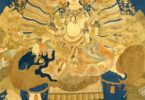《百喻经》
[The] Sūtra [Of A] Hundred Parables
(六四)人谓故屋中有恶鬼喻
[64] Parable [Of] People Saying [An] Old House Within Has [An] Evil Ghost
昔有故屋,人谓此室常有恶鬼,皆悉怖畏不敢寝息。
[In the] past, [there was an] old house, [with] people saying this house often has [an] evil ghost [within, with] all terrified, not daring [to] lie down [and] rest [in it].
时有一人自谓大胆,而作是言:「我欲入此室中寄卧一宿。」
Then, [there] was a person, calling himself [to have] great courage, then making this statement, ‘I desire [to] enter this house within [to] stay [and] sleep [for] one night.’
即入宿止,后有一人自谓胆勇胜于前人,复闻傍人言此室中恒有恶鬼,即欲入中排门将前。
Then, [he] entered [to] stay [and] rest. Later, [there] was a person [who] called himself [to have] courage [and] valour superior [to the] previous person. Again hearing bystanders saying this house constantly has [an] evil ghost within, then desiring [to] enter within, [he] pushed [at the] door, [and was] about [to] go forward.
时先入者谓其是鬼,即复推门遮不听前;在后来者复谓有鬼,二人鬪诤遂至天明。
Then, that [person who] first entered thought he is [a] ghost, then again pushed [at the] door, hiding [and] not allowing [him to] come forward. That later coming [person] again thought [there] is [a] ghost, [with the] two persons fighting [and] contending until daybreak.
既相覩已,方知非鬼。
Thereupon seeing one another already, then knowing [there is] no ghost.
一切世人亦复如是,因缘暂会无有宰主,一一推析谁是我者?
All [the] world’s people [are] likewise thus, [with] causes [and] conditions temporarily meeting, without having masters. [With] one by one inferring [and] analysing, who [is it] that is [the] self?
[Note 1: It is with the gathering of the five aggregates (五蕴) and the three poisons (三毒) that the illusion of ‘self’ (我) arises.
[Note 2: The five aggregates (五阴/蕴) are (i) form (色), (ii) feeling (受), (iii) perception (想), (iv) mental formation (行) and (v) consciousness (识).]
[Note 3: The three poisons (三毒) are greed (贪), anger (嗔) and delusion (痴).]
然诸众生横计是非强生诤讼,如彼二人等无差别。
Certainly, all sentient beings chaotically haggling [over what is] right [and] wrong, forcibly giving rise [to] contention [and] lawsuits, [are] like those two persons, equally without differences.
[Note 4: The illusion of ‘self’ is like a ‘ghostly being’ assumed to be there, but not really there. Arising from this delusional (痴) attachment, beings fight with one another with greed (贪) and anger (嗔).]
Namo Amituofo : Translation and notes by Shen Shi’an
上个喻
Previous Parable:
伎儿着戏罗刹服共相惊怖喻
[63] The Parable Of The Singing And Dancing Performer Wearing Rākṣasa’s Costume Together With One Another Alarmed
https://purelanders.com/2023/10/01/63-the-parable-of-the-singing-and-dancing-performer-wearing-rak%e1%b9%a3asas-costume-together-with-one-another-alarmed-from-the-sutra-of-a-hundred-parables
下个喻
Next Parable:
五百欢喜丸喻
[65] The Parable Of The Five Hundred Joy Pills
https://purelanders.com/2023/10/03/65-the-parable-of-the-five-hundred-joy-pills-from-the-sutra-of-a-hundred-parables
全百喻
All Hundred Parables:
https://purelanders.com/baiyu





